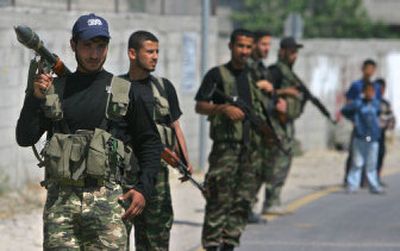Hamas deploys security force

GAZA CITY – In a sharp challenge to Palestinian Authority President Mahmoud Abbas, the Hamas-led government on Wednesday deployed a newly created police force made up mainly of members of Palestinian militant groups.
Clutching Kalashnikov assault rifles, the bearded gunmen fanned out across the Gaza Strip, moving in twos and threes along city streets and in refugee-camp alleyways. On a grassy traffic median, small groups of them shouldered their weapons and spread prayer rugs when the afternoon call to prayer wafted across the car-choked streets.
Abbas vetoed the creation of the 3,000-member force last month when it was announced by Interior Minister Said Siyam, a Hamas loyalist.
Hamas ignored the presidential decree, although it stayed quiet about the role of a well-known Palestinian militant, Jamal abu Samhadana, who had been named as the new force’s commander.
The deployment, which was moved up by 10 days, came against a backdrop of growing strife in Gaza between rival gunmen from Hamas and Abbas’ Fatah faction.
In a span of less than 24 hours on Tuesday and Wednesday, two members of Hamas’ military wing were killed in separate ambush-style shootings, and two other Hamas men were wounded in a third attack.
At a news conference, Siyam cited a wave of abductions and shootings as a sign of lawlessness he said the new force was set up to combat.
“We cannot ignore the fact that the security apparatus is weak – there are too many crimes and killings,” he said.
Allies of the moderate Abbas, who was traveling outside the Palestinian territories, swiftly denounced the Hamas move.
“The illegality of this force has already been declared, and it should be dismantled immediately,” said Nabil abu Rdeineh, a senior aide to the president.
Control of the Palestinian security forces, thought to number about 80,000 men, has been a key element in the ongoing power struggle between Abbas and the Hamas movement, which swept to victory in parliamentary elections in January.
The Islamist group has abandoned its campaign of suicide bombings in Israel. But it has refused to recognize the Jewish state’s right to exist or to renounce violence, and direct international aid to the Palestinian Authority has largely dried up as a result.
Under Palestinian law, the executive branch, once headed by Yasser Arafat, has direct control over about half of the security forces. After Hamas’ election, Abbas had consolidated the remainder under the command of a political ally, Rashid abu Shback.
At his news conference, Siyam complained that his rights as interior minister had been usurped.
“When I give clear and strong orders, many times they are not implemented,” he said.
The new force, he said, would report directly to him. No mention was made of abu Samhadana, whose appointment as the force’s commander had drawn heated protests from Israel and the United States. Abu Samhadana was implicated in a 2003 attack on an American convoy in Gaza that killed two U.S. security men.